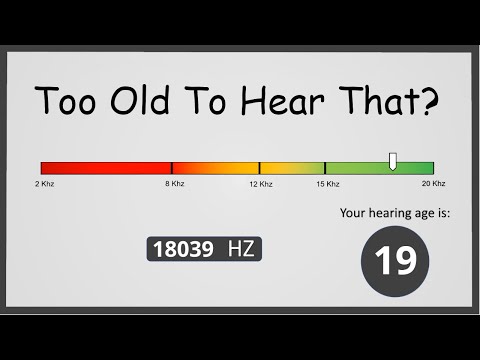How Old Are Your Ears ? Hearing Test
Hearing is one of our most vital senses, enabling us to communicate, stay connected with our environment, and even enjoy life’s simple pleasures like music and conversation. However, just like other parts of our bodies, our ears age. This process can lead to hearing loss, which affects a significant portion of the population. But how can you tell how old your ears really are? Enter the concept of hearing tests designed to gauge the age of your ears.
What Does It Mean for Your Ears to Have an “Age”?
The age of your ears doesn’t necessarily correspond to your biological age in years. Instead, it refers to the condition and functioning level of your auditory system. Factors such as prolonged exposure to loud noises, genetics, and overall health contribute to the aging of your ears. Understanding the “age” of your ears essentially involves assessing how well you can hear across various frequencies compared with typical hearing abilities at different life stages.
Types of Hearing Tests
There are several types of hearing tests that can help determine the relative age of your auditory health:
1. Pure Tone Audiometry: This test involves listening to sounds at various pitches and volumes through headphones in a soundproof room. The results help audiologists determine the quietest sounds you can hear at different frequencies, which is critical in diagnosing the degree and type of hearing loss.
2. Speech Recognition Test: This test assesses your ability to understand speech at different volume levels in a quiet or noisy background. It helps in understanding how well you can comprehend words and sentences, which is crucial for everyday communication.
3. Tympanometry: While not a direct test for hearing sensitivity, tympanometry assesses the health of your middle ear by measuring how it responds to pressure changes. It’s useful for detecting issues like fluid build-up or eardrum perforations that could impact hearing.
4. Otoacoustic Emissions (OAEs) Testing: This test measures sound waves produced by the inner ear when responding to sounds—a sign that the outer hair cells are functioning correctly. Absence or weak presence of these emissions might suggest hair cell damage.
How Do Hearing Tests Determine Ear Age?
By comparing your test results with standard thresholds established for various ages, audiologists can estimate whether your hearing is typical for someone who is younger, about the same age or older than you are biologically. If your hearing capability resembles what’s expected from someone much older than yourself, it might suggest premature aging due to noise exposure or other detrimental factors.
What Do The Results Mean For You?
Understanding the “age” of your ears is crucial for several reasons:
– Early Detection: Identifying any deviation from normal early on leads to better management strategies.
– Prevention: Knowing if you’re at risk allows you to take preventive action against further damage by avoiding overly loud environments or using protective gear.
– Treatment: For those already experiencing some form of hearing loss treatment options such as hearing aids can significantly improve quality-of-life by adapting devices specifically tailored to their frequency losses.
In Conclusion
Regular hearing tests are essential even if you don’t suspect any immediate issues with your ears They serve as a preventive measure just as regular check-ups help maintain other aspects of health As they say better safe than sorry By considering how old your ears might actually be compared with their biological age you’re taking an important step toward safeguarding one more facet important aspect—your ability maintain clear effective communication well into later years


